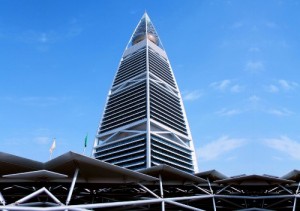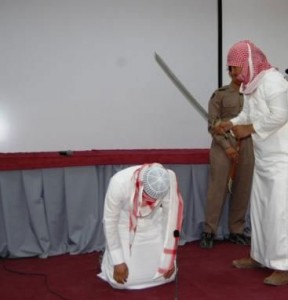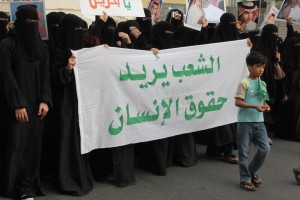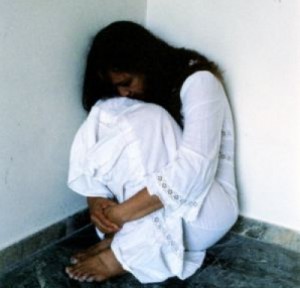There is something profoundly paradoxical about the new Al Faisaliah shopping center in Riyadh, Saudi Arabia. A sprawling, three-story compound complete with air-conditioning and wireless internet, the bustling shopping mall is chock full of US fast-food chains and swanky clothing shops boasting everything from bras to basketball shoes. And yet, these hallmarks of economic modernity and Western-style mass consumerism are strikingly juxtaposed with the rigidly imposed cultural mores that have changed only marginally since the days when Riyadh was little more than a collection of dirt streets and mud houses.

Indeed, government enforcement of social mores has set Saudi Arabia apart as one the world’s strictest and most traditional societies. The women roam from shop to shop clothed in full black abayas-garments that cover the entire body in order to disguise a woman’s form-and scan shelves of children’s clothes from behind face-covering niqabs. In the neighboring restaurants, unmarried men and women are not allowed to interact, and couples who choose to eat out are segregated by portable partitions. Women wishing to shop in the center or dine in these restaurants must rely on their male relatives to drive them, and they are not allowed to vote for the council members that advise the government on the development and establishment of these modern institutions. The enforcement of these and other rules, which generally mandate the segregation of men and women in all public arenas, falls under the responsibility of the Commission for the Promotion of Virtue and the Prevention of Vice, a government agency whose “morals police” monitors public areas to ensure that the rules are upheld to the highest standards of Islamic decency.
A Society of Paradoxes
This tension between modernity and tradition in Saudi Arabia is perhaps most palpable with regard to these laws toward women, but it is a paradox that has also manifested itself in virtually every branch of Saudi society. As Saudi Arabia develops, it has witnessed an ever-increasing number of contradictions between its modern economic institutions and rigid political and social systems. In a country whose economy is considerably dependent on the presence of foreign laborers, not to mention the innumerable Western professionals that contribute to the oil sector, there is still no freedom to worship any religion but Islam. Despite being one of the newest official voting members of the WTO, Saudi Arabia has still never had a national election-making it one of the world’s ten least democratic states, according to the Economist Intelligence Unit’s 2007 Democracy Index. Part of a multi-decade effort to strengthen the private sector, the country now has the strongest stock market in the region, but the kingdom’s would-be entrepreneurs are graduating from universities that are ranked among the lowest in the world. Barriers to foreign direct investment, which until recently had been insurmountably high, have been significantly lowered, and yet the state still refuses to grant tourist visas to Westerners, opening its borders only to Muslims that travel to Mecca on the Hajj.
The reality today is that Saudi Arabia is being pulled in two different directions. What is significant about this struggle, however, is the degree to which modernization has failed to permeate Saudi society beyond the economic sphere. Indeed, conventional wisdom among Western governments and institutions holds that economic prosperity will inevitably set developing nations on a road away from backwards political systems and toward pluralism, democracy, and liberalism. The Western view holds that with the development of a thriving middle class comes internal pressure to reform, and when this pressure becomes strong enough, incumbent regimes have no choice but to bow to the wishes of their people and liberalize their socio-political structures. Such beliefs have been the basis of much Western activity abroad in the last 50 years, with great hope being placed in institutions like the IMF and World Bank to bring about economic stability and eventual democratization movements. The theory has held up relatively well in certain regions of the world, but the trend in Saudi Arabia has established a new paradigm-defying certain beliefs about a direct connection between economic and political liberalization. Indeed, the pattern of change over the years in Saudi Arabia has demonstrated that more economic success can breed greater political oppression, for it is only in times of financial hardship that the country has achieved even marginal changes. As a result, political modernization in Saudi Arabia has not kept pace with economic liberalization. Today the kingdom stands at the forefront of developing nations in terms of wealth and infrastructure, but close to last with regard to political openness.
In 50 Years, from Rags to Riches
When King Abdul Aziz signed the treaty with the British government in 1932 that established the Saudi state, he inherited a fractured and backwards country that had next to no unified economy or infrastructure. For six years Saudi Arabia’s economy limped along, when in 1938, a team of US geologists stumbled across what would later be deemed the world’s greatest supply of natural oil, launching Saudi Arabia on a 50-year ascent to economic prosperity and material wealth. By the 1970s, the Saudi government, which receives almost 75 percent of its budgetary inflows from oil exports and controls 95 percent of all domestic oil production, was beginning to accrue vast revenues from Saudi oil exports. A confluence of factors in the mid-1970s led to this sudden economic acceleration, the greatest of which was an exponential growth in world oil prices (from $0.22 per barrel in 1948 to over $10 per barrel in 1974) caused by the 1973 Arab oil embargo. The government used this sudden surplus in oil revenue to launch a series of five-year development projects that would completely transform the kingdom into a thriving, modern society.
Even when world oil prices decreased sharply in the 1980s, the government under King Fahd continued to invest heavily in development and modernization, running significant budget deficits to pay for its projects. When the King died in August 2005, his obituary in the London Daily Telegraph referred to him as the “mastermind behind the modernization of his desert kingdom,” and indeed during his tenure as Crown Prince and then as King, he successfully spearheaded a series of structural developments that brought Saudi Arabia into the modern age.
Since the 1990s, similar modernization programs have continued, as Saudi Arabia has redirected revenues from oil exports toward infrastructure development, privatization, and economic diversification. Recently, King Abdullah bin Abdul Aziz, launched the construction of a US$6.7 billion financial district in Riyadh and partially privatized the Saudi stock exchange in the hopes of making Saudi Arabia the top financial center in the Middle East. The country joined the WTO in 2005, after the signing of the US-Saudi Trade Investment Framework Agreement, which forced it to dismantle many preexisting trade barriers. The regime has also begun to dismantle previously insurmountable barriers to foreign direct investment, which it hopes will further its goals of diversifying its private sector and becoming a leading financial player in the region.
Of course Saudi Arabia’s economy is still far from perfect. But in the last half-century the remarkable nature of the country’s economic transformation cannot be disputed. Funded almost completely by oil revenues, Saudi Arabia has gone from a country of fractured tribes living in sand-swept villages, to a thriving, industrial nation dotted with skyscrapers, superhighways, airports, and factories.
Setting a New Paradigm: Resisting Reform
And yet, despite the economic similarities between Saudi Arabia and the developed states of the West, the US House of Representative still voted on June 22 to withhold the minimal amount of foreign aid that the United States regularly grants to the kingdom, citing among its reasons Saudi Arabia’s dismal human rights records and its lack of progress in liberalizing its political system. It was a tangible sign that, despite claims over the last two years that Saudi society is “changing,” the country still has a long way to go before its social, legal, and political structures begin to resemble the modern character of its economy.
Although much has changed in Saudi Arabia since the country’s founding in 1932, the Saudi government has remained remarkably consistent with regard to its policymaking vision. It seeks to improve the economic welfare of the country’s citizens while also enforcing (sometimes ruthlessly) the country’s customs and traditions. The first half of this policy has been rigorously pursued through the reforms described above, but the latter half has manifested itself in repressive laws and a closed political system that are always justified on the basis of protecting Saudi Arabia’s Islamic heritage.
But this still does not explain why Saudi Arabia has bucked the prevailing consensus on the integral link between political and economic reforms. It does not explain the paradox of why, as Saudi Arabia’s populace has become richer, better educated, and more diversely opinionated, there has been almost no internal pressure for political liberalization. But, in the end, almost every trend in Saudi society can be explained by the single most important factor that has shaped the Saudi state-oil. And the complacency of the new Saudi middle class is ultimately no exception. The government, through its pet company Saudi Aramco, controls virtually all oil extraction and refining in the country and maintains its profligate social and economic spending through revenues from this oil production. The result is an economic welfare state of the most bizarre type, so bizarre that it has been given its own name by experts in the region-a rentier state. In such a state, rather than imposing taxes on its populace to raise the necessary cash for public projects, the government relies on a system of continuous revenues to fund not only economic development projects, but also a unique “welfare” program that tends to manifest itself in the form of simple public handouts. As long as the government can maintain these handouts, most citizens simply ask no questions-with no taxation, they demand no representation.
This system has been the primary factor behind the Saudi regime’s ability to maintain the same closed structure and enforce the same oppressive laws since its inception, guaranteeing the Al Saud family almost full carte blanche as they shape the country’s future and insulating them against the ramifications of poor or careless economic decisions. The resulting paradox is that as Saudi Arabia gets richer, its rulers find it easier to guarantee absolute rule. Prosperity in this case does not breed democratic change, but rather pushes Saudi society in precisely the opposite direction.
This unique phenomenon is perhaps best observed during the times that the Saudi economy has faltered. In the 1980s, when Saudi Arabia experienced its first major economic slowdown, public clamoring for political change garnered a promise from King Fahd to establish a consultative assembly (Majlis Al Shura) that would act as an advisory body to the Al Saud government. The promise turned out to be little more than hot air, however, with Fahd preferring to handle political dissidents with swift, repressive, and often violent justice. Indeed it was not until the years directly following the Gulf War, when international oil prices collapsed and public spending was cut, that middle-class technocrats and young Islamic fundamentalists generated enough public opposition to pressure the Fahd regime to honor its promise and establish the Majlis Al Shura-with all delegates appointed by the government. Then in the late 1990s, shrunken oil earnings again motivated the Saudi populace to speak out. These calls for change coincided with increasing pressure from the West for Saudi Arabia to reform its repressive political structure, and culminated in the kingdom’s first elections in 42 years. In 2005 Saudi men (women were excluded) were allowed for the first time to vote for half of the members of their local town councils (which have only an advisory role in government planning)-the other half of the members were, of course, appointed by King Abdullah. Despite the fact that only 25 percent of eligible voters participated (part of that Saudi apathy that has been instilled by 30 years of government handouts), these elections were hailed around the world as a major first step away from authoritarianism and were construed as a sign that, finally, Saudi Arabia was making efforts to reform.
Four consecutive years of sky-high oil prices and unprecedented economic growth have demonstrated the opposite. Indeed, far from motivating further reform of the authoritarian bureaucracy, these revenues have allowed King Abdullah to consolidate his already tight grip on power. The “democratically elected” town councils have proven to be even more ineffective and powerless than predicted. A law enacted in 2005 prohibits any employees of the government (government workers comprise two-thirds of the native workforce) from speaking out publicly against the regime’s policies. The signatories of a 2004 petition advocating the transformation to a constitutional monarchy have been forbidden to travel, and the authors of a more recent petition advocating reform have been arrested on trumped-up charges of terrorism. Despite a slew of promises from the regime in 2005, there have been no discussions as of yet regarding the establishment of further elections, even for the toothless town councils. Maybe if oil prices suddenly fall again (which looks unlikely) there will be another round of internal pressures and, perhaps, another election, but current trends indicate that the Saudi regime is perfectly content to continue as it always has-developing its economy with all the latest in modern technology and structural reforms, while keeping a tight grip on political power.
Bridging the Gap: Options for the Future
The paradoxical combination of Saudi economic modernization and deficient socio-political reforms proves that the West cannot sit back and hope that further increases in Saudi prosperity will boost the strength and numbers of the Saudi middle class, resulting in internal pressures for the reform of the oppressive political system and its equally ruthless legal code. Nor, for that matter, can the world’s democracies rely on random economic slow-downs and unpredictable decreases in oil prices to be the impetus for reforms. Of course the Saudi economy cannot grow forever and there will inevitably be future recessions, but to expect that such downturns will be the transformative force in Saudi political society is both naive and irresponsible.
If the West is serious about pushing for democratization in the region, it must develop a more comprehensive and effective strategy than the passive waiting game that has been the policy until now. Unfortunately, there appears to be no way to combat the social welfare policies of the Saudi government that have been so successful in establishing the deep sense of complacency among the Saudi people. However, the last decade has demonstrated that opposition to the regime does exist-and the government has had to rely more frequently on direct methods of repression and political silencing to combat internal opposition to its policies. If these voices are allowed to speak out and maintain pressure on the Al Saud government, then there is a chance that Saudi Arabia’s future may be far more democratic than its past. As the 2005 elections demonstrated, the Saudi regime will bend under pressure-especially when that pressure comes both from within the state and from the international community.
Saudi Arabia’s Western allies, upon whom the kingdom depends for diplomatic, political, military, and even economic support, have the ability to push the Saudi regime toward real political and social reforms. Further, if such pressure can be sustained, with strong internal calls for reform being consistently matched by equally condemnatory external criticism, then the Saudi regime may have no choice but to take further steps toward liberalizing its political structure and amending its draconian legal measures. Indeed this may be the only way by which the Saudi government can be forced to bridge the ever-increasing gap between its modernized economy and its repressive socio-political institutions.
By Killian Clarke





























